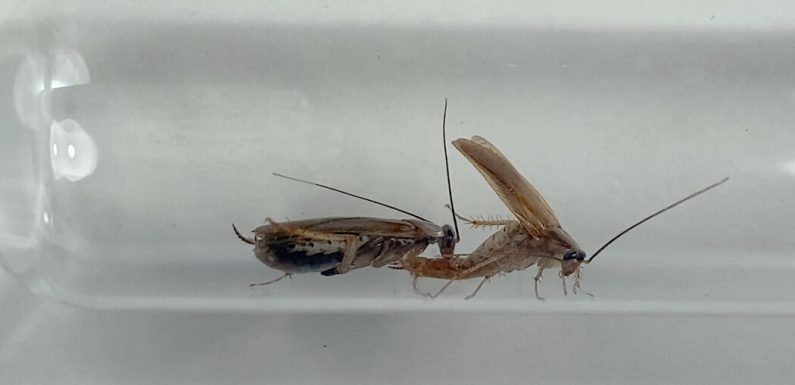
Cockroaches are changing up their sex lives, and it’s all our fault. Faced with sweet poisoned bait, roaches first ended up with a mutation that made them hate sweets, hindering their mating strategies. Now, more roach mutations are emerging, showing you can’t keep a good pest down.
Like many animals, cockroaches have a sweet tooth, and that preference for sugar plays a central role in their reproductive activities. When a male roach targets a female roach, he will back up to her, secreting a solution called a nuptial gift from the tergal gland under his wings. The solution is full of proteins, fats and sugars, what some researchers call the chocolate of roach food. The female cockroach will crawl up on his back to take a sample, and while she is occupied, the male will whip out a hooked penis to latch onto her reproductive tract. They will then turn back to back and do the deed for about 90 minutes.
Humans have aimed to exploit this love of sweet stuff to push cockroaches — particularly the German cockroaches that turn up in American homes — out of our spaces. For decades, people used poisoned roach baits baited with solutions containing glucose.
Cockroaches took the bait. But some time in the late 20th century, a new mutation arose — glucose aversion. No one knows how many roaches now hate the sweet stuff, but Coby Schal, an evolutionary biologist at North Carolina State University, suspects the mutation is very common. “There are more and more papers being published on the fact that a whole suite of baits don’t work so well,” he said.
This lack of a sweet tooth saved cockroaches from death, but it hurt their sex lives. The gift that normal males secrete contains maltose, a sugar that cockroach saliva transforms into glucose. But if females had the glucose averse mutation, they did not find the male secretions sexy and turned away before the male could hook on.
But Dr. Schal and his colleagues could not help but notice that males with glucose aversion were still getting lucky with glucose-averse females. They took a close look, comparing mating between sweets-loving roaches and the sugar-free variety.
In a study published on Wednesday in Proceedings of the Royal Society B, the scientists showed that the glucose-averse males had accumulated additional mutations. Instead of producing nuptial gifts containing more maltose, they produced ones that contained a more complex sugar, maltotriose. That substance takes longer to break down into glucose in a female roach’s saliva, Dr. Schal said, and “it’s actually preferred by females.”
But even with a sweeter gift, the glucose-averse roaches were taking no chances. Sugar-loving males took a lengthy 3.3 seconds to begin mating with a female while she dined, Dr. Schal said, which meant they only succeeded about half the time. Sugar-free males leaped into action in 2.1 seconds, succeeding 60 percent of the time.
Marlene Zuk, an evolutionary biologist at the University of Minnesota Twin Cities who was not involved in the study, praised it, saying it was interesting to “people who don’t care about cockroaches qua cockroaches” and that it revealed facets of how mating behaviors evolve.
“It illustrates really well that there’s this constant balance,” between the pressures of survival and the pressure to mate as much as possible, she said.
But the latest mutations emerged among lab-reared roaches, noted Richard ffrench-Constant, who studies the molecular biology of insects at the University of Exeter in England.
“Whether these are the traits that are really going to emerge in nature I think is open to discussion,” said Dr. ffrench-Constant, who was not involved in the study.
Dr. Zuk added that these mutations did not emerge purposefully. Glucose aversion solved one problem and created another, but male roaches were not going around trying to make sweeter nuptial gifts. For every mutation that helps a roach get lucky, another might achieve the opposite.
“Stuff just happens,” she said. “There’s no guarantee that says you’re going to make it somehow.”
But this time, roach romance has come out on top.
Source: Read Full Article
